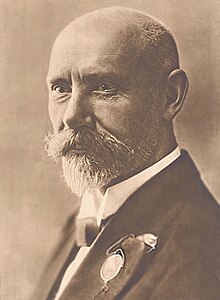Jānis Čakste
| Jānis Čakste | |
|---|---|
 |
|
| 1st President of Latvia | |
|
In office 17 December 1918 – 14 March 1927 Acting: 17 December 1918 – 14 November 1922 |
|
| Prime Minister |
Kārlis Ulmanis Zigfrīds Anna Meierovics Jānis Pauļuks Zigfrīds Anna Meierovics Voldemārs Zāmuēls Hugo Celmiņš Kārlis Ulmanis Arturs Alberings Marģers Skujenieks |
| Succeeded by | Pauls Kalniņš (Acting) |
| Personal details | |
| Born | 14 September 1859 Sesava parish, Courland Governorate, Russian Empire Now (Jelgava Municipality, Latvia) |
| Died | 14 March 1927 (aged 67) Riga, Latvia |
| Political party |
Kadets (1906) Latvian Farmers' Union (1917-1919) Democratic Centre (1922-1927) |
| Spouse(s) | Justīne Čakste |
| Children | 8 |
Jānis Čakste (14 September 1859 in Lielsesava (now Viesturi parish), Latvia – 14 March 1927 in Riga, Latvia) was a Latvian politician and lawyer who served as the first head of an independent Latvian state as the Chairman of the People's Council (1918–1920), the Speaker of the Constitutional Assembly (1920–1922), and as the first President of Latvia (1922–1927).
Čakste was born in the Lielsesava parish of the Jelgava district, the son of a farmer. He received his primary education at St Anne's Primary School, and entered the Academia Petrina in Jelgava, where he participated in student "evenings" advocating Neo-Latvian ideals. After graduating in 1882, he entered the law faculty of Moscow University. While studying in Moscow, Čakste founded a local Latvian Student Society in 1883, which later became the academic fraternity "Austrums" and actively participated in the activities of the local Latvian community along with Krišjānis Valdemārs and Fricis Brīvzemnieks. Čakste graduated in 1886 and returned to Jelgava.
After graduating from Moscow University, he worked at the legal department of the Courland Governorate and, from 1888, as a lawyer in Jelgava. In 1889 he became the editor of the newspaper “Tēvija”, which became one of the most widely read Latvian-language newspapers in Courland. In 1895 he became one of the chief organisers of the 4th All-Latvian Song Festival in Jelgava, and partly financed the event out of his own pocket. In the course of the Russian Revolution of 1905 he collaborated on a project for creating Latvian national autonomy within the Russian Empire.
...
Wikipedia
